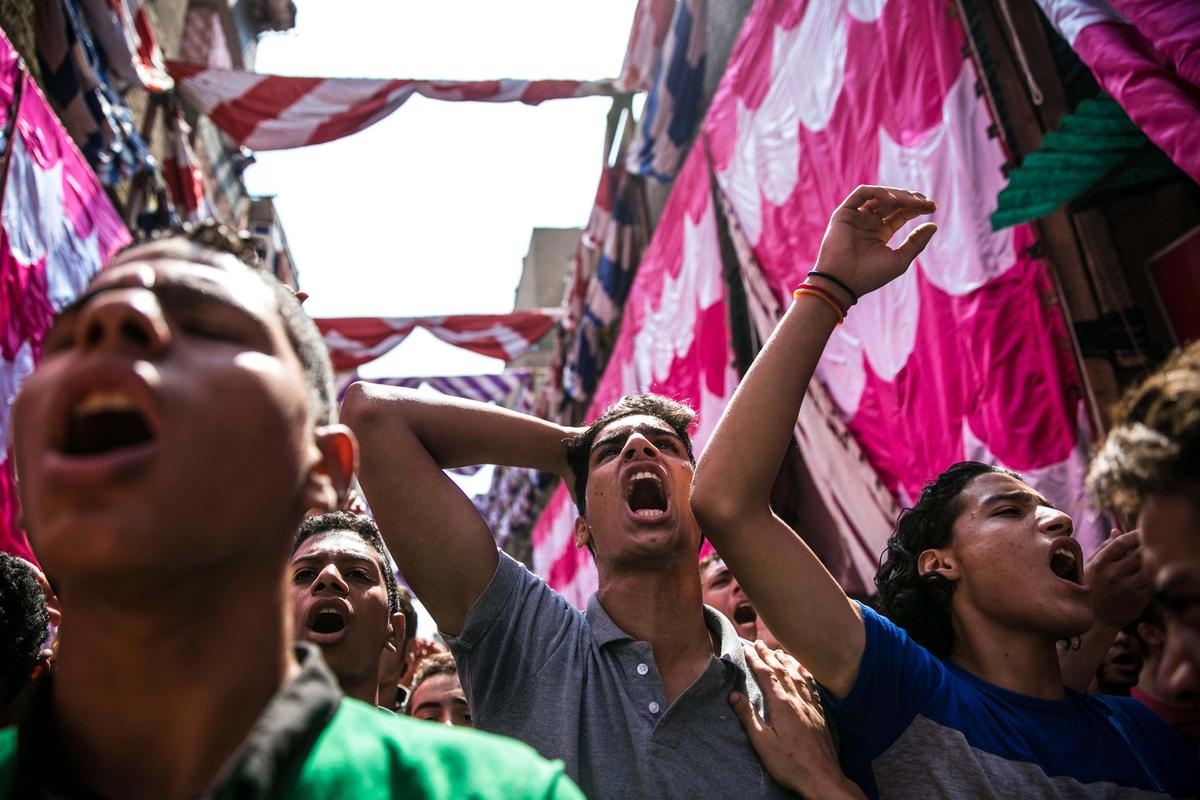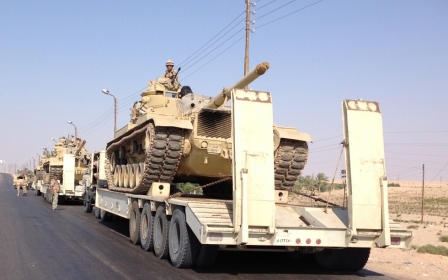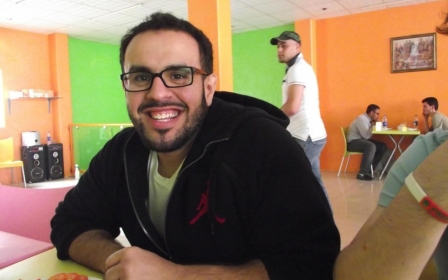From the streets to starvation: Egyptian hunger strike gains traction

It has been nearly 250 days since Mohamed Soltan has last eaten. Soltan, an Egyptian-American, who was arrested and jailed last summer after the Rabaa shootings, is currently on hunger strike in protest of his politically motivated arrest and the abuse he faces in Egypt’s prison system. After almost eight months on hunger strike with little medical treatment, Soltan’s condition is rapidly deteriorating. He was hospitalised this week after losing consciousness, but was later returned to solitary confinement in Tora Prison.
In support of Soltan and all Egyptians imprisoned for political causes, an assembly of activist groups, prisoners, and syndicates has begun an open-ended hunger strike with the ultimate goal of repealing the controversial “protest law” and releasing all political prisoners.
Since the dispersal of the Rabaa sit on 14 August 2013, more than 40,000 Egyptians have been arrested for political reasons, according to Wikithawra, an independent statistic-collecting group set by the Cairo-based Egyptian Center for Economic and Social Rights that has been collecting human rights abuse data since Hosni Mubarak’s ouster.
Many, like Soltan, are held without charge, denied proper medical treatment, and kept in overcrowded and bare prisons. Most of the prisoners were arrested during protest dispersals, notably Rabaa and the ensuing protest in Ramses Square several days later. Others, like Soltan, were arrested on warrants. The campaign has been widespread and haphazard, as Middle East Eye has reported, with bystanders with little political affiliation, being swept in with the mass arrests.
“This is a different strategy to support the strike inside the prison and to send a message to the government and the police, that we want freedom for the strikers inside the prison," said Zizo Abdo, a member of the April 6th Movement. “The government is responsible for the health of prisoners. They are afraid that if someone dies or has a physical problem, they will be responsible, so they’ll release them.”
The hunger strike is being organised by a new campaign called “We Have Had Enough” and includes activists like Mahienour El Massry, Alaa Abd El Fattah, Ahmed Douma, April 6 Youth Movement co-founder, Sanaa Seif, sister of Abd El Fattah, and members of the syndicates of journalists, doctors, engineers and lawyers, and several political parties. According to Marwa Arafa, one of the campaigns organizers, there are 246 strikers, 170 of them held in prisons, police stations or detention camps, with more joining daily.
“We are not trying to send our message to the normal people,” Abdo said. “Our message is directed to the government, that we are strikers and we have demands and message to them.”
Most hunger strikers have chosen to only drink water, tea without sugar, supplements to avoid permanent nerve damage and rehydration solution for the loss of electrolytes, Ahmad Mamdouh, a Cairo University medical student who serves as the medic for the hunger strikers, explained. Others allow fruit juice in addition to the water and vitamins. Many continue to smoke cigarettes.
“It's not about Alaa, as we have an obligation towards people who are striking. We are continuing, it's purely human thing,” said Arafa, one of the organisers on strike. “You cannot hold people for a year without a trial or a hearing without a sentence and then say no, there are not political detainees or prisoners in hunger strike."
Strikers like Arafa have turned to the hunger strikes because of the dangers involved in protesting in Egypt now. “This [hunger strike] is the last resort because we consumed all means of protest, but there are countless reasons behind it. It is a life or death protest. We can't give them our backs,” she said.
The controversial protest law, which was enacted in November 2013, created the legal justification for arresting people who were publicly protesting. This law - combined with the police forces’ increasing use of live ammunition and lethal force -has pushed activists to protest using innovative tactics.
“As we cannot protest on the street, we do it like this,” said Mamdouh. “We want to tell to the people that complained about us being on the streets demonstrating that we have a vision and we are ready to sacrifice our health to face the system.”
Syndicate participants like Amr El Shora, a board member for the doctor’s syndicate, strike in protest of the further violations the government has committed. “We are supporting because we had lots of complaints from inside the jails of disease, infections, people deprived from health care, people abused,” he said.
The doctor’s syndicate, Shora explained, has repeatedly been denied access to sick prisoners like Soltan. “By law, our syndicate is responsible of monitoring public health, but we don't have access to Military, Ministry of Interior or prison facilities,” he said. According to Shora, since August 2013, 270 doctors have been arrested from field hospitals, for political activity, or for violating the protest law. Only 66 have been released, he said.
So far the strike has seen some success, with the government releasing several activists and pledging to meet to reconsider the protest law. Abdullah Shamy, the Al Jazeera reporter who was also arrested during Rabaa, was on hunger strike for over 100 days before he was released. Alaa Abd El Fattah was released from prison while on hunger strike, but pledged to continue. Others though, like Soltan, continue their hunger strikes in prisons, unable and unwilling to treat their deteriorating bodies.
“They said they will amend the protest law but we don’t trust them, so we will continue until they cancel it,” Mamdouh said.
Activists and prisoners have long used hunger striking as a powerful form of protest, but it is physically draining and dangerous. Some strikers pledge limited periods of time, while others like Mamdouh and Arafa pledge to continue indefinitely.
“When you feel you are doing something good for the people, it gives you the power to continue,” Mamdouh said.
“The rest of the citizenship? People who always cared still care. People who didn't care do not. What this campaign did is to unite people who cared,” Arafa added.
Middle East Eye propose une couverture et une analyse indépendantes et incomparables du Moyen-Orient, de l’Afrique du Nord et d’autres régions du monde. Pour en savoir plus sur la reprise de ce contenu et les frais qui s’appliquent, veuillez remplir ce formulaire [en anglais]. Pour en savoir plus sur MEE, cliquez ici [en anglais].



